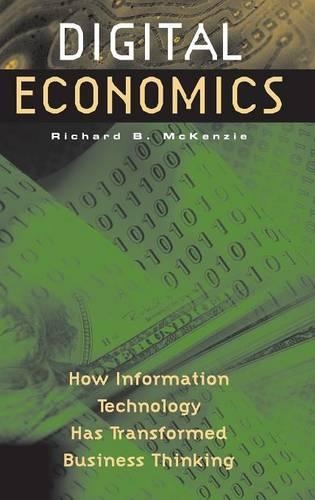
Digital Economics: How Information Technology Has Transformed Business Thinking
(Hardback)
Publishing Details
Digital Economics: How Information Technology Has Transformed Business Thinking
By (Author) Richard McKenzie
Bloomsbury Publishing PLC
Praeger Publishers Inc
30th May 2003
United States
Classifications
Tertiary Education
Non Fiction
338.5
Physical Properties
Hardback
336
Width 156mm, Height 235mm
652g
Description
The digitization of such traditional goods as books, music, and movies, in combination with traditional digital productions like software, has given rise to new twists and turns in economic arguments. The primary reasons for these digital-led developments in economic theory are that digital goods often exhibit network effects-consumer benefits that grow with the spreading use of certain goods-and that digital products often have low or negligible reproduction costs. McKenzie describes how the advent of digital goods has forced changes in firms' production and pricing strategies, and how it has led to the reassessment of an array of public policies, from privacy to piracy.
Reviews
Nobel laureate Robert Solow's observation that "you can see the computer revolution everywhere but in the productivity statistics" touched off a torrent of research on productivity gains from computer usage. Results of that research have been a mixed bag according to McKenzie only recently has there been any indication that computers contribute to increasing productivity. The first part of McKenzie's book deals with just this problem. He then examines other equally interesting aspects of information technology, introducing new terms (e.g., network effects, network externalities, lagged demands, tipping, dependency, feedback effects, switching costs, lock-ins) as he examines the economic aspects of how digitization has changed the economy and the way business is conducted....Explanations and arguments are accessible to anyone with an introductory economics background. For serious researchers, footnotes and bibliography provide thorough documentation. Highly recommended. Upper-division undergraduate through professional collections.-Choice
"Nobel laureate Robert Solow's observation that "you can see the computer revolution everywhere but in the productivity statistics" touched off a torrent of research on productivity gains from computer usage. Results of that research have been a mixed bag according to McKenzie only recently has there been any indication that computers contribute to increasing productivity. The first part of McKenzie's book deals with just this problem. He then examines other equally interesting aspects of information technology, introducing new terms (e.g., network effects, network externalities, lagged demands, tipping, dependency, feedback effects, switching costs, lock-ins) as he examines the economic aspects of how digitization has changed the economy and the way business is conducted....Explanations and arguments are accessible to anyone with an introductory economics background. For serious researchers, footnotes and bibliography provide thorough documentation. Highly recommended. Upper-division undergraduate through professional collections."-Choice
Author Bio
RICHARD B. MCKENZIE is the Walter B. Gerken Professor of Enterprise and Society in the Graduate School of Management at the University of California, Irvine, where he teaches courses for MBA students on microeconomics for managers, managing organizational incentives, and digital economics. He is also a regular columnist for Investor's Business Daily.
